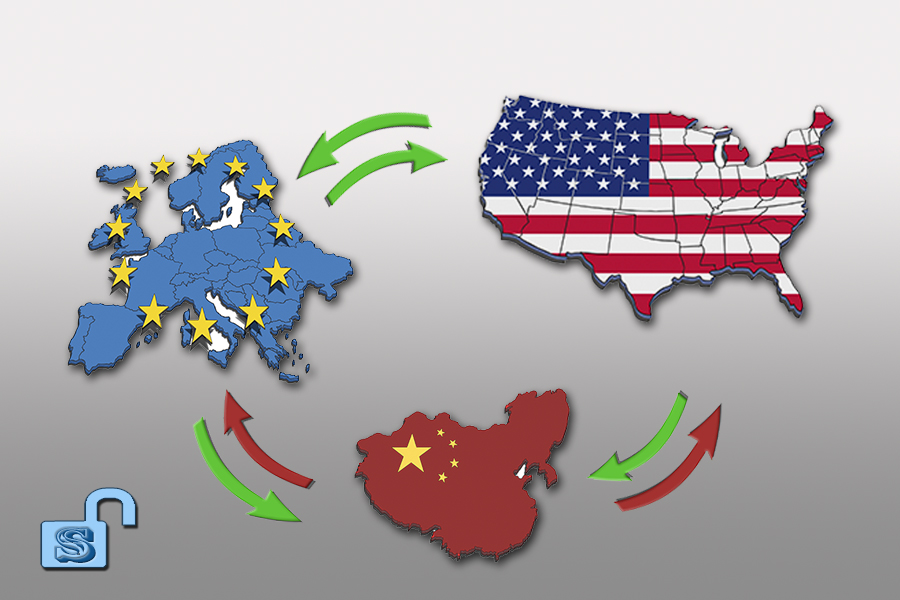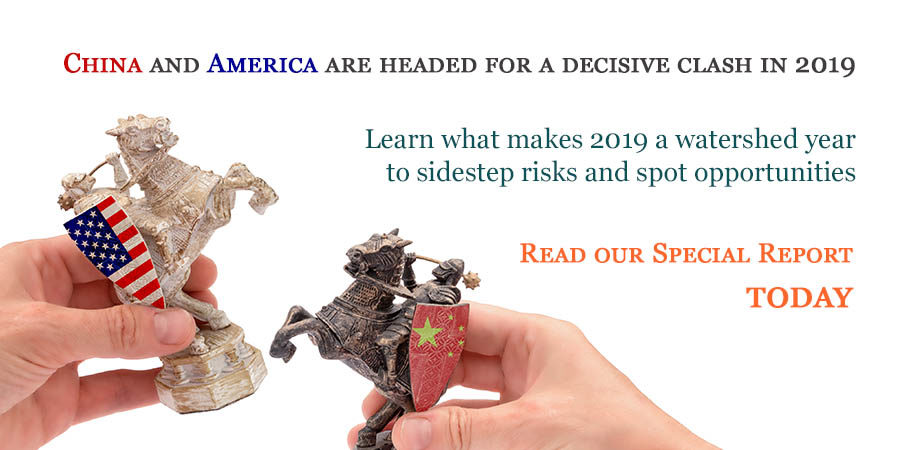◎ The stalemate in Sino-U.S. trade negotiations has led to a stalemate in global geopolitics.
Edited on April 12, 2019.
China’s Xi Jinping embarked on a six-day trip to Europe on March 21. He visited Italy, Monaco, and France. In France, Xi met with French President Emmanuel Macron, German Chancellor Angela Merkel, and European Commission President Jean-Claude Juncker.
Xi’s trip comes amid extended China-U.S. trade talks and jittery global markets.
Our take:
The stalemate in Sino-U.S. trade negotiations has led to a stalemate in global geopolitics. We look at how China, the European Union, and the United States are coping with geopolitical uncertainty.
China
In his meeting with French President Macron on March 25, Xi Jinping said that major countries should find ways to get along with each other based on “independence, mutual understanding, foresight, mutual benefit and win-win outcomes.”
While meeting the heads of France, Germany, and the EU in Paris on March 26, Xi Jinping said that China and the EU should “increase positive energy” and that “cooperation is greater than competition.” On the same day, Huawei unveils its new smartphones at a Paris launch event.
1. Xi’s trip to Europe gives the Chinese regime a chance to address several short and long term issues and strategies.
In the short term, Beijing needs both leverage and a backup plan for the Sino-U.S. trade talks. The Trump administration has made it clear that there will not be further negotiations if the current round of trade talks fail. So Xi has to court Europe and build up trading relations in preparation for the worst-case scenario. Courting Europe also allows Beijing to drive a tougher bargain in trade negotiations with the United States. Success in Europe would give the CCP regime more confidence in the trade talks and in standing up to America over the long term amid the shift in the bilateral relationship from engagement to strategic competition.
Beijing also needs to court Europe to resolve the existential crisis facing its technology sector and reverse China’s economic downturn. The Trump administration’s moves against ZTE and Huawei have essentially barred the Chinese tech giants from breaking into the U.S. market. Also, senior U.S. officials have been cautioning allies and partner nations against adopting Chinese tech, particularly 5G, due to national security concerns. America’s efforts have disrupted the CCP’s 5G push at a time when the regime is counting on its tech sector to create a breakthrough for the worsening Chinese economy. The Party lacks viable channels to rescue the economy. The regime’s so-called “Internet Plus” model recently showed signs of unsustainability with Chinese internet company Meituan Dianping reporting huge losses and the closure of property unicorn Aiwujiwu. Meanwhile, depending on the housing market for growth is no longer an option with the collapsing of the once-hot property market. Further, tax and free cuts will end up increasing, and not decreasing, the financial burden of struggling Chinese enterprises. Given what’s at stake, it is no wonder that Xi Jinping made Europe his first foreign trip of 2019 and why Huawei chose to hold a launch event in Paris to coincide with Xi’s meeting with top EU leaders.
As we previously analyzed, survival and dominance are two sides of the same coin for the CCP. Courting Europe is in line with the Party’s ultimate agenda of global domination. The CCP will gain a crucial foothold in Europe if countries adopt Huawei’s 5G and join the Belt and Road Initiative. The Party will also try to divide and isolate EU member countries. For instance, the CCP could target European countries with severe debt problems first. In the long run, a fractured EU whose members are in China’s pockets will not be able to form an effective alliance with the U.S. to counter CCP expansionism.
2. The enforcement issue and structural changes appear to be the biggest sticking points of Sino-U.S. trade negotiations thus far.
Structural issues are very tricky for the CCP regime to handle. If Beijing refuses to compromise, it risks inviting crippling U.S. tariffs and sanctions. Most at risk are Chinese tech giants like Huawei, which faces the very real possibility of collapse should America go “all-in” on sanctions and bring the Meng Wanzhou case to its logical conclusion. Yet if Beijing compromises and cannot delay making structural reforms (circumventing a U.S. trade enforcement mechanism and other tactics), then the regime faces an existential crisis.
Breakthrough on the enforcement issue may come more easily. During a press conference in early March, Chinese vice commerce minister Wang Shouwen said that any enforcement mechanism between China and the U.S. must be “two way, fair and equal.” A two-way enforcement mechanism would help the CCP save face and swallowing other concessions much easier. If only China is forced to adopt an enforcement mechanism, the Chinese people will blame the Party for signing a humiliating “unequal treaty” and its political legitimacy will come under threat.
3. With the extradition process of Huawei CFO Meng Wanzhou set to move forward and the U.S. government’s deep skepticism of Chinese technology, Huawei will find it virtually impossible to expand in America. In fact, the company will count itself extremely fortunate if it somehow avoids further U.S. sanctions. Going forward, Huawei will likely shift its primary focus to the European market.
Europe
On March 12, the EU releases a strategy paper which labels China an “economic competitor” in key fields like 5G and political “systemic rival.” The paper also addresses the risks posed by Chinese investments in strategic sectors.
On March 22, French President Emmanuel Macron said during a press conference that “the period of European naivety is over” with regard to China. “The relationship between EU and China must not be first and foremost a trading one, but a geopolitical and strategic relationship,” he said.
On March 23, Italy and China signed a memorandum of understanding that makes Italy the first G7 nation to join the Belt and Road project. Both countries also signed $2.8 billion worth of deals (with a potential value of 20 billion euros). Earlier on March 9, U.S. National Security Council spokesman Garrett Marquis tweeted that the Italian government should not “lend legitimacy to China’s infrastructure vanity project.”
On March 25, France and China signed 15 business contracts worth billions of euros. Among the deals include a 1 billion contract for Électricité de France to build an offshore wind farm in China and the purchase of 300 planes from Airbus (about 30 billion euros).
1. Europe has traditionally aligned itself with America on China policy. Thus, despite misgivings about the Chinese regime’s economic and political maneuvers on the continent, European countries did not really pushback against China during the era of Sino-U.S. engagement.
As seen from the recent EU strategy paper on China and statements from European leaders, Europe has joined the U.S. in shifting its stance on China. Europe’s shift, however, currently seems to have been carried out more in speaking than in spirit given the flurry of deals that were hammered out during Xi Jinping’s Europe trip. A possible reason for the EU’s lack of conviction in forming a united front with the U.S. in countering the CCP threat could be unhappiness with the Trump administration. After all, President Donald Trump did impose some tariffs and threatened to levy more, demanded that NATO members pull their weight in contributing towards defense spending, and is seeking to negotiate a new U.S.-EU trade deal.
From Xi’s trip to Europe, EU nations are presently looking to secure their interests first and appear to be using China as a bargaining chip for dealing with America. From a certain perspective, it is understandable why some EU nations, especially those facing a debt crisis, are motivated to deepen trade and relations with China. Recent history, however, has demonstrated that the CCP is a rogue regime and cannot be trusted to strictly adhere to its side of the bargain. EU nations face very high levels of political risk in building closer relations with the Chinese regime.
2. Other U.S. allies also appear to be taking advantage of the global geopolitical stalemate to court China instead of holding firm with America.
On March 25, New Zealand prime minister Jacinda Ardern said that she is traveling to Beijing at the end of the week to meet with Xi Jinping; New Zealand is a party of the Five Eyes intelligence alliance. On the same day, Japanese prime minister Shinzo Abe said that Japan could possibly join the Belt and Road provided that four conditions are met, according to Japanese news reports.
However, just like the EU nations, Japan and New Zealand will be playing with fire by aligning themselves too closely with the Chinese regime.
United States
U.S. Trade Representative Robert Lighthizer and U.S. Treasury Secretary Steven Mnuchin are scheduled to travel to Beijing for trade talks on March 28. Meanwhile, Washington will receive a Chinese trade delegation led by vice premier Liu He on April 3.
According to a March 17 report in The New York Times, President Trump, Vice President Mike Pence, Robert Lighthizer, and other advisors recently huddled in a meeting to discuss “whether China is serious about offering concessions or if it was merely paying lip service to Mr. Trump.”
1. The U.S. needs a trade deal with China to reduce the trade deficit, resolve forced technology transfer issues for good, gain unrestricted access to China’s markets, restore optimism to the stock markets, and grow the economy. For Trump, securing a big win with China would bolster his 2020 re-election bid.
The biggest obstacle, however, remains the issue of implementing a working enforcement mechanism to ensure that the CCP sticks to the deal.
2. If the Times’s reporting is accurate, then the Trump administration still suspects whether China is negotiating in good faith. At the same time, the administration does not appear to want to miss the opportunity to strike a deal.
The CCP seems to have sensed Washington’s unwillingness to abandon negotiations when things look like they are “close” to being wrapped up. The Trump administration’s attachment to the deal has thus created an opening for the CCP to exploit with its classic delaying tactics.
America currently still has the upper hand in dealing with the CCP regime. But the U.S. will lose its advantage should the Trump administration continue to miss strategic windows of opportunity.
Get smart:
We correctly identified the present geopolitical stalemate in our 2019 special report.













